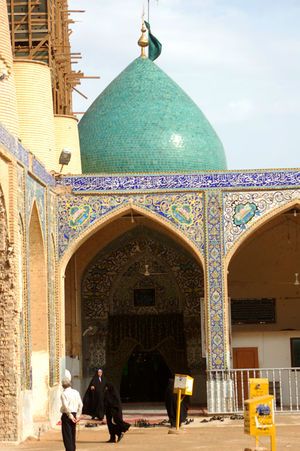In the annals of Islamic history, Hani Ibn Urwah emerges not merely as a figure of the past, but as a luminous paragon of loyalty, advocacy, and moral rectitude within the Shia tradition. His narrative intertwines with the historical trajectory of the early Islamic community, encapsulating the essence of unwavering allegiance to principles and the pursuit of justice. To grasp the significance of Hani Ibn Urwah within Shia teachings, one must delve deeper into both his life and the sociopolitical context that shaped his convictions.
Hani Ibn Urwah, a protégé of the illustrious Imam Ali, epitomizes the virtues espoused by Shia Islam, bringing to life the metaphorical tapestry of loyalty that runs through the veins of Islamic ethos. Just as a steadfast oak withstands the fiercest storms, Hani's unwavering commitment to Imam Hussein during the tumultuous period leading to the Battle of Karbala portrays a profound dedication to justice and truth. This metaphor of resilience serves as a beacon of hope for adherents, showcasing the importance of standing firm in one’s beliefs, even when faced with insurmountable odds.
Born in Kufa, a nucleus of scholarly and political discourse during the early Islamic era, Hani’s life unfolded amidst a kaleidoscope of sociopolitical intrigues. His steadfastness in the face of formidable adversity is most notably illuminated during his fearless support for Imam Hussein’s cause. Hani's actions transcended mere allegiance; they demonstrated a profound understanding of the Islamic principles of justice, equity, and self-sacrifice. The teachings of Shia Islam emphasize that true faith is not just a silent affirmation but an active engagement in the fight against tyranny and injustice, a theme brilliantly illustrated by Hani’s life.
The events leading up to the Battle of Karbala serve as a critical lens through which to appreciate Hani Ibn Urwah’s contributions. When Imam Hussein, faced with a dire choice between fealty to a corrupt regime and the quest for justice, chose the latter, Hani emerged as one of his most devoted supporters. His commitment represented not only personal loyalty but also epitomized a collective aspiration for the restoration of righteous governance grounded in ethical principles. Hani's multifaceted persona reveals the quintessential Shia belief that faith must manifest in tangible action, particularly in times of moral crisis.
Hani's refusal to capitulate to the oppressive forces of Yazid Ibn Muawiya further solidified his legacy within the Shia narrative. In the face of coercion and intimidation, his unwavering stance symbolized the broader struggle against moral degradation. His life offers profound lessons on the importance of personal sacrifice for communal welfare, reflecting the Shia ideal of martyrdom not solely as a physical act but as a holistic lifestyle committed to virtue, resilience, and societal betterment. The metaphor of martyrdom in Shia thought thus transcends the physical realm, extending into ethical dimensions that resonate with adherents today.
The aftermath of the Battle of Karbala magnifies Hani’s legacy within Shia discourse. His indomitable spirit, characterized by an unyielding defense of Imam Hussein, marked him as a symbol of fidelity to the principles of justice. It is within this context that Hani's teachings echo the Shia ethos of enjoining good and forbidding evil. His life becomes an allegory for the perennial struggle against oppression, inviting future generations to heed the call of justice, irrespective of the potential costs involved.
The philosophical underpinnings of Hani's devotion extend into essential Shia doctrines. Central to these is the concept of Imamat, which posits the leadership of the Imams as divinely ordained, thus establishing an unwavering connection between the Shia community and its rightful leaders. Hani’s narrative serves as a conduit for understanding the profound relationship between personal integrity and collective responsibility in Shia thought. This relationship nurtures a sense of communal identity that galvanizes efforts toward social justice, echoing the mantra ‘to be with the truth, even if you stand alone.’
In a contemporary framework, the reverberations of Hani Ibn Urwah's teachings continue to inspire Shia Muslims around the globe. His life exemplifies the vital necessity for active engagement in societal matters, advocating for the marginalized, and standing against tyranny—a clarion call that resonates throughout the corridors of history. The contemporary relevance of Hani's narrative underscores the notion that the principles he championed are not mere relics of the past, but living doctrines that challenge adherents to embody the fullest expression of Islamic tenets in their daily lives.
Ultimately, the teachings of Hani Ibn Urwah encapsulate a myriad of virtues—loyalty, courage, integrity, and justice—all of which are fundamental to the Shia understanding of faith. His legacy offers a compelling invitation to engage with the teachings of Shia Islam on a deeper level, encouraging adherents to reflect on their own lives in light of the moral complexities they confront daily. In a world often marred by injustice and discord, the principles exemplified by Hani serve as both compass and anchor, guiding Shia Muslims toward a future anchored in the pursuit of justice, empathy, and collective well-being.


